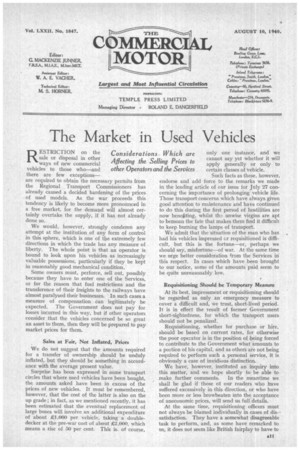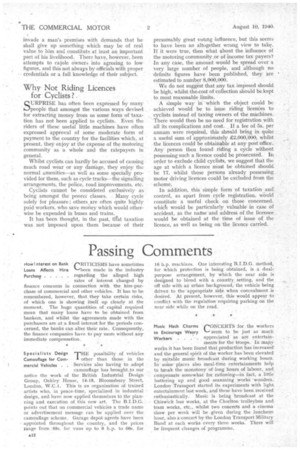The Market in Used Vehicles
Page 13

Page 14

If you've noticed an error in this article please click here to report it so we can fix it.
RESTRICTION on the sale or disposal in other ways of new commercial vehicles to those who—and there are few exceptions— are required to obtain the necessary permits from the Regional Transport Commissioners has already caused a decided hardening of the prices of used models. As the war proceeds this tendency is likely to become more pronounced in a free market, for the demand will almost certainly overtake the supply, if it has not already done so.
We would, however, strongly condemn any attempt at the institution of any form of control in this sphere, which is one of the extremely few directions in which the trade has any measure of liberty. The whole point is that an operator is bound to look upon his vehicles as increasingly valuable possessions, particularly if they be kept in reasonably good mechanical condition.
Some owners must, perforce, sell out, possibly because they have to enter one of the Services, or for the reason that fuel restrictions and the transference of their freights to the railways have almost paralysed their businesses. In such cases a measure of compensation can legitimately be expected. The Government does not pay for losses incurred in this way, but if other operators consider that the vehicles concerned be so great an asset to them, then they will be prepared to pay market prices for them.
Sales at Fair, Not Inflated, Prices We do not suggest that the amounts required for a transfer of ownership should be unduly inflated, but they should be something in accordance with the average present value.
Surprise has been expressed in some transport circles that where used vehicles have been bought, the amounts asked have been in excess of the prices of new vehicles. It must be remembered, however, that the cost of the latter is also on the up grade ; in fact, as we mentioned recently, it has been estimated that the eventual replacement of large buses will involve an additional expenditure of about £1,000 per vehicle, taking a doubledecker at the pre-war cost of about £2,000, which means a rise of 50 per cent. This is. of course, only one instance, and we cannot say yet whether it will apply generally or only to certain classes of vehicle.
Such facts as these, however, endorse and add force to the remarks we made in the leading article of our issue for July 27 concerning the importance of prolonging vehicle life. Those transport concerns which have always given good attention to maintenance and have continued to do this during the first period of hostilities are now benetting, whilst the unwise virgins are apt to bemoan the fate that makes them find it difficult to keep burning the lamps of transport.
We admit that the situation of the man who has had his vehicles impressed or requisitioned is difficult, but this is the fortune—or, perhaps we should say, misfortune—of war. At the same time we urge better consideration from the Services in this respect. In cases which have been brought to our notice, some of the amounts paid seem to be quite unreasonably low.
Requisitioning Should be Temporary Measure At its best, impressment or requisitioning should be regarded as only an emergency measure to cover a difficult and, we trust, short-lived period. It is in effect the result of former Government short-sightedness, for which the transport users should not be penalized.
Requisitioning, whether for purchase or hire, should be based on current rates, for otherwise the poor operator is in the position of being forced to contribute to the Government what amounts to a portion of his capital, and as others are not being required to perform such a personal service, it is obviously a case of invidious distinction.
We have, however, instituted an inquiry into this matter, and we hope shortly to be able to make further comments. In the meantime we shall be glad if those of our readers who have suffered excessively in this direction, or who have been more or less browbeaten into the acceptance of uneconomic prices, will send us full details.
At the same time, requisitioning officers must not always be blamed individually in cases of dissatisfaction. They have a somewhat disagreeable task to perform, and, as some have remarked to us, it does not seem like British fairplay to have to invade a man's premises with demands that he shall give up something which may be of real value to him and constitute at least an important part of his livelihood. There have, however, been attempts to cajole Owner, into agreeing to low figures, and this not always by officials with proper credentials or a full knowledge of their subject.
WhyNot Riding Licences for Cyclists?.
SURPRISE has often been expressed by many people that amongst the various ways devised for extracting money from us someform of'taxation has not been applied to cyclists. Even the riders of these useful little machines have often expressed approval of some moderate form of payment to the country for the facilities which, at present, they enjoy at the expense of the motoring community as a whole and the ratepayers in general.
Whilst cyclists can hardly be accused of causing much road wear or any damage, they enjoy the normal amenities—as well as some specially provided for them, such as cycle tracks—the signalling arrangements, the Police, road improvements, etc.
Cyclists cannot be considered exclusively as being amongst the poorer classes. Many cycle solely for pleasure ; others are often quite highly paid workers, who save money which would otherwise be expended in buses and trains.
It has been thought, in the past, that taxation was not imposed upon them because of their presumably great voting influence, but this seems to have been an altogether wrong view to take. if it were true, then what about the influence of the motoring community_or of income tax payers? In any case, the amount would be spread over a very large number of people, and although no definite figures have been published, they are estimated to number 8,000,000.
We do not suggest that any tax imposed should • be high, whilst the/cost of collection should be kept to most reasonable limits.
A simple way in which the object could be achieved would be to issue riding licenees to • cyclists instead of taxing owners of the machines. There would then be no need for registration with all its complications and cost. If a fee of 5s. per annum were required, this should bring in quite a useful sum of approximately £2.000,000, whilst the licences could be obtainable at any post office. Any person then found riding a cycle without possessing such a licence could be prosecuted. In order to exclude child cyclists, we suggest that the age at which a licence Must be obtained should_ be 17, whilst those persons already possessing motor driving licences could be excluded from the scheme.
In addition, this simple form of taxation and control, as apart from cycle registration, would constitute a useful check on those concerned, which would be particularly valuable in case of accident, as the name and address of the licensee would be obtained at the time of issue of the licence, as well as being on the licence carried.




















































